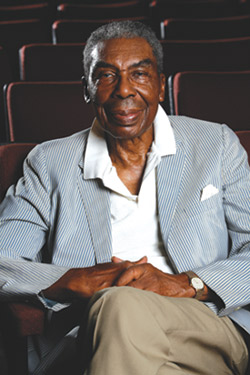BY ANN FARMER
 (Photo Credit: Mark Mahaney)
(Photo Credit: Mark Mahaney)
In a few months, James E. “Jimmy” Wall turns 90. But only last week, he filled in as a stage manager for 60 Minutes, a show he worked on for its inaugural episode in 1968. “My wife says, ‘I thought you were retired,’” Wall chuckles. “But I like to work.”
Wall’s bulging scrapbook attests to his long, passionate career as a performer and stage manager. In one photo, he’s got studio headphones wrapped around his neck and a beaming smile as he stands alongside Dan Rather, Walter Cronkite and other distinguished CBS News anchors, whose programs he stage-managed for many years.
Carefully folded among all the mementos is a program from a 1994 DGA Awards ceremony, when he received the prestigious Franklin J. Schaffner Award in recognition of his achievements and service to the Guild. “It was excellent,” he says, recalling how touched he was when 60 Minutes veteran and PBS interviewer Charlie Rose introduced him during the ceremony.
“I enjoyed my time with the Guild, and I am proud to be part of it,” he says. For many of his 45 years he served on the Eastern AD/SM/PA Council, always willing to dispense friendly advice.
“He was an inspiration for many of us,” says Scott Berger, DGA assistant secretary-treasurer and associate director on the CBS Evening News, describing how Wall mentored him and numerous other Guild members during his 27 years on staff at CBS. “He’s been one of the most generous, giving people I’ve ever met.”
Wall began his career as a teenage hoofer on the streets of New York. His first vaudeville act, which took him to Paris and Rio, was known as “Hunt & Wall, the Two Slims.” During World War II, he served as a master sergeant in the Army, performing for Eleanor Roosevelt and the troops. Afterwards, he landed various roles on Broadway, where he also began working as an assistant stage manager. Often he stage-managed and performed in the same show.
When CBS hired him as a stage manager in 1962, the same year he joined the Guild, he became only the second black stage manager at the network. He would have been the first if he’d been hired when he initially applied, years earlier: “They said, ‘You have an excellent background, and we’d love to use you, but we don’t think it’s time to put a Negro in that position,’” he recalls.
When his break finally came, Wall’s theatrical background served him well. “Much of what we do electronically now was then done by hand,” he says, so it was even more critical to grasp the director’s needs. In fact, many television production techniques were being developed by people like Wall who had migrated from the theater.
“He was part of that group that set things in motion,” says Berger, describing how Wall always presented a positive example of how to run the floor. Even when an anchor asked him to wear white gloves so she could better see his fingers. “He always proceeded with professionalism and with the most courteous manners,” says Berger, who adds that Wall’s resonant baritone, when he gave the countdown into 60 Minutes, became the exemplar. “Everyone emulated him.”
After six years as stage manager on the groundbreaking children’s program Captain Kangaroo, Wall convinced the producers to create an African-American character, the friendly next-door neighbor Mr. Baxter. Wall ended up snagging the role himself. Later, he recalls, the lead actor, Bob Keeshan, came up to him and said, “You son of a bitch, you got the role—not because we know you and like you—you were the best.”
Wall left the East Coast Council in 1988 because he felt that it was the right thing to do to let younger members have a shot at serving. But he refuses to stop working, and continues to stage-manage at CBS whenever they need him. “He is an amazing guy,” says Berger. “He still has it.”